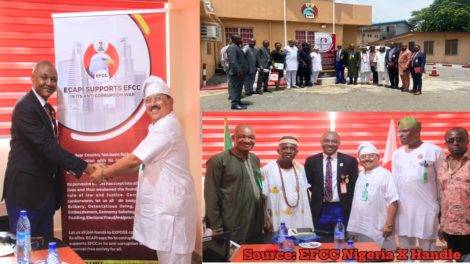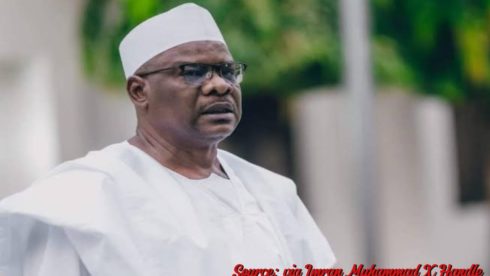Ola Olukoyede, the Executive Chairman of the EFCC, emphasized the pivotal role of Civil Society Organizations (CSOs). Addressing members of the Eagle Crime Awareness & Prevention Initiative (ECAPI) in Lagos, Ola Olukoyede urged CSOs to deepen their commitment to combating corruption, highlighting their significance as critical stakeholders in this endeavor. The interactive session underscored the imperative for enhanced collaboration between CSOs and law enforcement agencies to achieve more substantial progress in the anti-graft campaign.
Ola Olukoyede, represented by EFCC’s Lagos Zonal Commander, ACE I Michael Wetkas, stressed the mandate for zonal commands to engage proactively with relevant stakeholders. He emphasized the indispensable contribution of CSOs in fostering good governance, advocating for their active involvement in supporting anti-corruption initiatives.
The Role of CSOs in Anti-Corruption Efforts
Ola Olukoyede reiterated the indispensable role of CSOs in ensuring accountability and responsiveness in governance. He urged CSOs to be proactive in holding public officials accountable, emphasizing the detrimental effects of unchecked corruption on national development. By actively participating in anti-corruption activities, CSOs can play a crucial role in safeguarding the nation’s resources and promoting transparency.
CSOs, according to Ola Olukoyede, serve as watchdogs, advocating for ethical conduct and exposing corrupt practices. Their engagement in awareness campaigns and advocacy efforts amplifies the anti-corruption message, fostering a culture of integrity and accountability within society.Ola Olukoyede’s call for stronger collaboration underscores the recognition of CSOs as vital allies in the fight against corruption.
Ola Olukoyede Empowering CSOs for Effective Engagement
Recognizing the potential of CSOs to drive meaningful change, Ola Olukoyede emphasized the need to empower these organizations for more effective engagement. This entails providing necessary resources, capacity-building initiatives, and institutional support to bolster their anti-corruption efforts. By equipping CSOs with the tools and knowledge required to navigate complex governance issues, stakeholders can amplify their impact and influence.
Additionally, fostering partnerships between CSOs and governmental institutions can facilitate information sharing and collaborative initiatives. Ola Olukoyede highlighted the importance of leveraging the diverse expertise and networks within the CSO community to enhance the effectiveness of anti-corruption interventions. Through sustained investment in CSO capacity development, stakeholders can cultivate a robust ecosystem of accountability and transparency.
Ola Olukoyede Presents CSOs as Catalysts for Change
Ambassador Samuel Eniola Adam, President of ECAPI, reiterated the shared responsibility of all Nigerians in the fight against corruption. Emphasizing the critical role of CSOs as catalysts for change, Adam underscored the importance of citizen engagement and collaboration with law enforcement agencies. By fostering a culture of civic participation and collective action, CSOs can drive systemic reforms and promote ethical governance practices.
Adam reaffirmed ECAPI’s commitment to supporting the EFCC in its anti-corruption endeavors, emphasizing the need for sustained advocacy and awareness campaigns. Through strategic partnerships and grassroots mobilization, CSOs can amplify their impact and effect positive change in communities nationwide. Adam’s remarks underscored the pivotal role of CSOs as agents of accountability and social transformation.
Ola Olukoyede Building Trust and Transparency
Central to the success of anti-corruption efforts is the establishment of trust and transparency between stakeholders. Ola Olukoyede emphasized the importance of fostering open communication channels between CSOs, law enforcement agencies, and the public. By promoting dialogue and collaboration, stakeholders can build mutual trust and strengthen partnerships for collective action against corruption.
Transparency in governance processes and decision-making is essential for fostering accountability and preventing corruption. Ola Olukoyede reiterated the EFCC’s commitment to upholding transparency standards and urged CSOs to hold government officials accountable for their actions. Through increased transparency and accountability mechanisms, stakeholders can mitigate corruption risks and promote public trust in governance institutions.
EFCC’s Partnership with CSOs to Combat Corruption in Nigeria
In Nigeria’s ongoing battle against corruption, Ola Olukoyede’s engagement with Civil Society Organizations (CSOs) signals a crucial shift towards embracing collective responsibility. By uniting with CSOs, stakeholders can pool resources and expertise to tackle systemic issues effectively. This collaborative approach not only amplifies the impact of anti-corruption efforts but also fosters a culture of accountability and transparency within Nigeria’s governance framework. Through coordinated action and strategic partnerships, the EFCC and CSOs are working together to address the root causes of corruption, thereby laying the groundwork for sustainable change and progress.
The partnership between the EFCC and CSOs underscores a shared commitment to upholding integrity and combating corruption at all levels of Nigerian society. By actively involving CSOs as advocates for anti-corruption reforms, the EFCC acknowledges the indispensable role these organizations play in safeguarding public interest and holding leaders accountable. This partnership not only enhances the effectiveness of enforcement measures but also strengthens public trust in government institutions. With sustained collaboration and a united front against corruption, stakeholders can pave the way for a more equitable and prosperous future for all Nigerians, where transparency and accountability are paramount.
Table of Contents
Discover more from OGM News NG
Subscribe to get the latest posts sent to your email.













